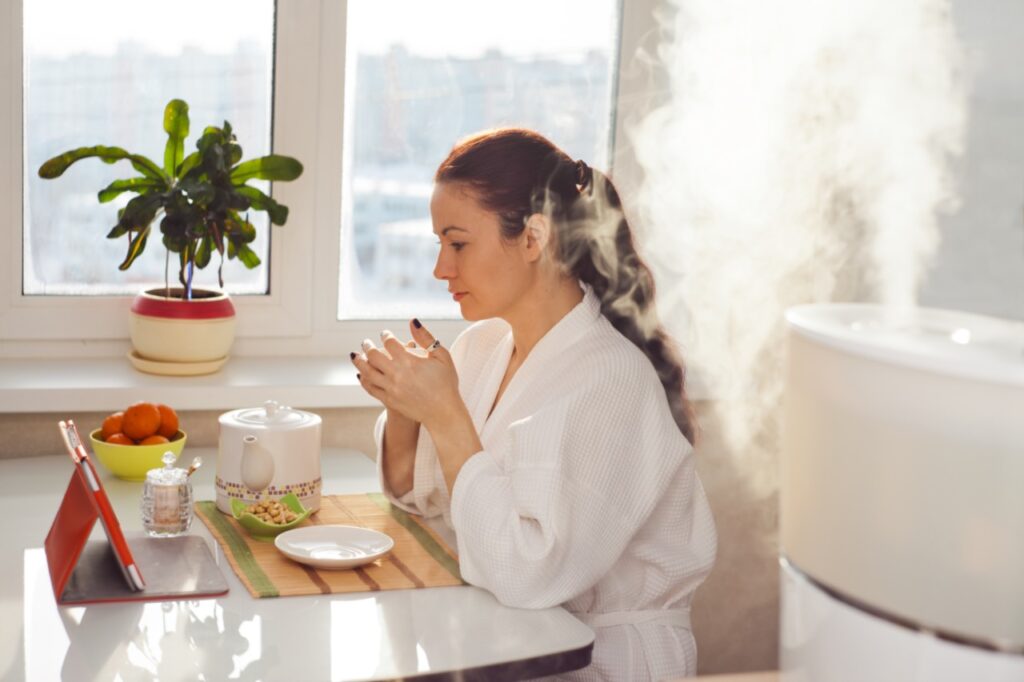What is a humidifier used for
The natural humidity levels vary across seasons. If you are in an area that experiences dryer seasons, the air can be drier. Even cranking up the AC (air conditioner) can result in dryer air as you strive to keep your house warm deep during cold winter months or cool in the hotness of summer. Dry air causes health concerns much like overly humid air does. Adding a humidifier is an excellent way to improve the humidity, positively impacting your health.
Benefits of a humidifier for your health
The top health benefits of a humidifier include:
Avoid germs spread
Did you know that the influenza virus thrives in drier conditions? You might be focused on the cold temperatures, but that’s not the only thing causing the flu since the germ survives in colder, drier conditions. Adding some humidity can significantly keep the virus at bay, avoiding its spread. This is a significant check, especially for individuals with asthma and other respiratory problems. The flu only worsens the conditions. The humidifier can keep the air moist to desirable levels, ensuring the germ’s survival rate is not as high. It’s one of the benefits of a humidifier in the bedroom.
Allergy and asthma management
Coughs, nose bleeds, dry and itchy throat, sinus congestion, and runny nose, to mention a few asthma and allergy symptoms, are aggravated by dry air. The humidifier in your home can improve the air condition, which helps soothe the nose and throat tissues. This keeps the symptoms from flaring up, but you shouldn’t overdo it. If the humidity levels rise too much, you risk exposure to dust mites, bacteria, and mold, which can cause as much chaos as dry air. So monitor the humid levels, and strive to keep it at 50% or less.
Helps with congestion
The respiratory tract’s cell lining produces more mucus when you are ill. As the mucus dries, it becomes sticky, and the dry air only accelerates. Such stickiness means coughing or blowing your nose becomes harder. The humidifier keeps the humidity levels higher, moistening the nasal passage, which can help loosen congestion. This makes it easier to expel mucus when you blow the nose or cough, avoiding accumulation and drying.
Keep snoring low
Snoring is not just unpleasant. It could signify obstructive sleep apnea (OSA), a serious sleep disorder that poses significant health threats. Many sleep apnea patients use CPAP (continuous positive airway pressure treatment) machines. The machines blow dry air, and as more innovative solutions hit the market, humidifiers are added to keep the air moist. These bring moisture to the air in your home. The humidifier helps avoid congestion and other symptoms like a stuffy nose, which can worsen snoring. Keeping snoring low allows you to enjoy quality sleep, a critical check in any health regimen. Enough rest gives your body a break to repair from all the wear and tear experienced throughout the busy periods. It also gives your heart a break, lowering the pressure to keep it healthier. These are some benefits of a humidifier while sleeping. Thus, regularly use a humidifier while you sleep.
Improves skin health
You know how important moisturizing your skin is and even have invested in quality products. You apply the moisturizer whenever heading out, but did you know you could experience as much damage to the skin when indoors? Dry air pulls moisture from your skin. This makes it dry and irritated. Dry skin, especially if you are prone to atopic dermatitis (eczema), can be a significant problem. Rashes and skin cracking can take a toll on you, ruining your youthful and striking looks. If you have other skin conditions, such as breakouts, the dryness only aggravates the situation, extending to impacting the efficacy of your skincare products. Investing in a humidifier can also supercharge your skin care regimen. With moist indoor air, you’ll keep the skin flexible and at its best, maintaining your glowing looks. These are the benefits of a humidifier for the skin.
Better hair
Your scalp can be affected by dry air, much like the skin. Besides an itchy scalp, you can experience other frustrating situations like dandruff. Your hair also takes a blow, considering the effect on collagen. The dry air could be the reason your hair is becoming brittle. That dullness splits and frizzing could stem from the dry air, which you can address with a humidifier and avoid thinning and eventual hair loss.
Benefits of humidifiers for your home
A humidifier is an excellent addition to your home as you strive to improve your health. The Humidifier benefits don’t end with your health, though. There a more reasons why you should use a humidifier:
Indoor plants thrive as they get enough air and water from the soil and don’t lose much due to dryness Save money as you lower air conditioning demands since the humid levels makes it warmer Keep wooden furniture and others in good condition (dry air can cause wood to shrink, crack, and split) Reduce static electricity: Notice how touching certain fabrics results in little shocks? Improved humidity levels can eliminate such annoyances.
So, you are ready to start shopping; which humidifier should you buy? First, consider the space you’ll use and pick one that’ll provide the right output. Then decide if you want the warm or cool mist to help narrow the types. From here, you can consider the features and use ease, energy consumption, and noise levels.
Make sure to clean your humidifier
Humidifiers are great and offer the best service if you also give them some tender love and care. Weekly cleaning is recommended to ensure no mineral build-up and create a perfect environment for mold growth. The good news is that the process is straightforward and doesn’t require buying any special cleaning agents. Distilled water and hydrogen peroxide, for example, will suffice. Also, remember to replace the filter if the humidifier has one, as recommended by the manufacturer.
